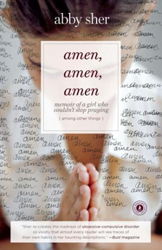Join a community of readers who are committed to Jewish stories
Sign up for JBC’s Nu Reads, a curated selection of Jewish books delivered straight to your door!
Abby Sher, author of Amen, Amen, Amen: Memoir of a Girl Who Couldn’t Stop Praying (Among Other Things), is blogging all week for MyJewishLearning and the Jewish Book Council.
 There are some things I love to change -– my socks or stationery, for example. I’m also okay with changing radio stations, as long as it hovers near NPR. But with most other aspects of my life -– which train I ride, which journals I write in, which side of the bed, side of the debates, seat at the table, coffee filters, pens, did I mention I’m wearing my t‑shirt from sixth grade graduation as I type this? -– when it comes to personal evolution, I’m not so great.
There are some things I love to change -– my socks or stationery, for example. I’m also okay with changing radio stations, as long as it hovers near NPR. But with most other aspects of my life -– which train I ride, which journals I write in, which side of the bed, side of the debates, seat at the table, coffee filters, pens, did I mention I’m wearing my t‑shirt from sixth grade graduation as I type this? -– when it comes to personal evolution, I’m not so great.
Which is probably why I found it particularly unacceptable when my synagogue decided to feng shui its sanctuary. Larchmont Temple is a Reform congregation founded in 1948 that stands near Manor Park in a stately brick building with broad white pillars that as a child I often felt were G‑d’s sturdy open arms, welcoming all inside and holding up the roof as we sang the Shema. I’m sure there were plenty of structural reasons for the shift -– the sanctuary I’d grown up in was long and narrow, sort of like a bowling alley with the rabbi and cantor at two pulpits surrounding the ark. There were a few dozen rows of benches, but for High Holidays they had to open the back doors and put out folding chairs through the hall where we usually had our oneg. Sometimes a television was even wheeled in to the people stuck in far corners so they could see what they were missing on the bima.
There could have been religious reasons for the move too. There is an entire wall of exquisite stained glass that spells out many of the prayers and in the old setting; it was kind of just a backdrop, or really side-drop. Which was fine with me because it gave me a beautiful place to wander when we were supposed to be listening to the sermon. But after the renovation, the ark stood in front of the side wall. Everything was moved into what I thought of as the center of the room. Even the special flickering lamp that was supposed to represent the eternal flame. I always wondered if it really flickered when they rewired it. I felt bad for the electrician in charge of that one.
Whatever the motive, it was done, and my mother was none too pleased about it. I had already graduated college and settled in Chicago at this time. Home for few days’ visit, she brought me over to take a look. Rabbi Sirkman was a good friend of ours, and happily showed us around.
“That’s cool,” I offered, wandering towards the commemoration wall, where deceased congregants’ names were written above small ledges. There were pebbles on the bottom so family members could place a marker as they said kaddish.
“Yeah, it’s nice,” Mom said. Then she sighed loudly, “I don’t know, it’s just not the same.”
“Sorry, Joan,” said the rabbi.
It was a peculiar sense of homelessness. The entrance even looked like it’d been tipped sideways. The familiar clangs of the coffee urns being rinsed in the kitchen were replaced with a soft swish swish of vacuumed carpet under our feet.
As we left, I felt bad for my mom, and also for myself. I knew that I was supposed to be an adult. I paid my rent on time, brushed my teeth and held down a job, but I was unprepared to find a house of worship on my own. I thought that eternal lamp was fixed in G‑d’s indelible scheme. How would I know where to find that kind of safety and stability again?
Abby Sher is the author of Amen, Amen, Amen: Memoir of a Girl Who Couldn’t Stop Praying (Among Other Things). Come back all week to read her blog entries. And, check out her official website here.